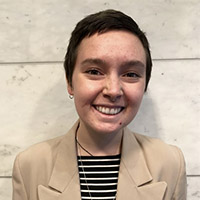By Izzy Aguiar
At the Career Fair, Graduate Student and Industry Reception, held Monday night during the 2017 SIAM Annual Meeting in Pittsburgh, Pa., an inconspicuous table stood at the far end of the room. The table touted a humble sign reading “Communication Doctors.” Although the booth was sparse at the beginning of the night, it quickly attracted a large and diverse group of mathematicians from all stages of life.
The Communication Doctors booth was an opportunity for attendees to ask experienced “doctors” how to best turn complex research into an appealing story, receive advice on crafting an effective message about one’s research, and solicit feedback about CVs or presentations.
Carla Cotwright-Williams, Candice Price, Paul Constantine, and myself (lucky me!) all served as communication doctors. Throughout the course of the evening, students and professors tentatively approached the booth; we enthusiastically greeted them with a chorus of, “Do you need your communication doctored?!” We followed the greeting with a sequence of questions diagnosing the “symptoms” that the “patient” was experiencing. The doctor would then critique a presentation, converse about the patient’s research, or point out inconsistencies or impracticalities in a CV.
When evaluating how to communicate your research with others, one of the most important questions is, “Who is my audience?” Are you explaining your research’s relevance to a potential employer? Are you presenting a new method to a group of peers familiar with your research? The answer to these questions ultimately guides the content of the presentation or conversation. Prepare the content based on what the audience will care about, rather than what you will care about.
Communication doctors offer attendees of the SIAM Annual Meeting advice on how to effectively communicate complex STEM research to a common audience.
Upon reflecting on the advice and questions during the session, I’ve found that comfort in one’s own research is often most harmful when communicating its relevance and importance to others. When immersed in our own research-realities, we find it even more difficult to empathize with those who are not; the more one understands about a particular subject, the more likely that person is to falsely attribute that knowledge to everyone else. This notion is perpetuated in a community where asking questions that imply ignorance or misunderstanding is perceived as a reflection of a lack of intelligence. In communicating our research to others, we must remember that Albert Einstein once said, “If you can't explain it to a six-year-old, you don't understand it yourself.”
Be sure to keep an eye out for the Communication Doctors at next year’s Annual Meeting: the doctors will be back with even better advice.
 |
Izzy Aguiar has her B.S. in applied mathematics and statistics from the Colorado School of Mines and is pursuing her M.S. in computer science at the University of Colorado, Boulder. Izzy is passionate about interdisciplinary research, the power of education, and the importance of effective communication. |